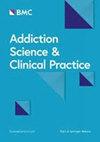Comparing cognitive behavioral therapy and social prescribing in patients with loneliness on long-term opioid therapy to reduce opioid misuse: protocol for a randomized controlled trial
IF 3.7
2区 医学
Q1 SUBSTANCE ABUSE
引用次数: 0
Abstract
Patients with chronic pain on opioids frequently experience loneliness, which is associated with poorer health outcomes and higher risk for opioid misuse and opioid use disorder. Given that almost half of opioids are prescribed in primary care, a critical need exists for the development and testing of interventions to reduce loneliness in primary care patients at risk for opioid misuse. Cognitive behavioral therapy and social prescribing have been shown to be efficacious in reducing loneliness and improving outcomes in other populations but have not been tested in patients at risk for substance use disorder. The overall objective of our study is to reduce opioid misuse and opioid use disorder by addressing loneliness in patients on long-term opioid therapy in real-world primary care settings. We will conduct a 3-arm pragmatic, randomized controlled trial to compare the effectiveness of two group-based, telehealth-delivered interventions with treatment as usual: (1) cognitive behavioral therapy to address maladaptive thought patterns and behaviors around social connection and (2) a social prescribing intervention to connect participants with social opportunities and develop supportive social networks. Our primary outcome is loneliness as measured by the UCLA Loneliness Scale and our dependent secondary outcome is opioid misuse as measured by the Common Opioid Misuse Measure. We will recruit 102 patients on long-term opioid therapy who screen positive for loneliness from 2 health care systems in Washington State. Implementation outcomes will be assessed using the RE-AIM framework. Our study is innovative because we are targeting loneliness, an under-addressed but critical social risk factor that may prevent opioid misuse and use disorder in the setting where most patients are receiving their opioid prescriptions for chronic pain. If successful, the project will have a positive impact in reducing loneliness, reducing opioid misuse, improving function and preventing substance use disorder. NCT06285032, issue date: February 28, 2024, original.在长期接受阿片类药物治疗的孤独患者中比较认知行为疗法和社交处方,以减少阿片类药物滥用:随机对照试验方案
使用阿片类药物的慢性疼痛患者经常会感到孤独,这与较差的健康状况以及较高的阿片类药物滥用和阿片类药物使用障碍风险有关。鉴于近一半的阿片类药物是在基层医疗机构处方的,因此亟需开发和测试干预措施,以减少有阿片类药物滥用风险的基层医疗机构患者的孤独感。认知行为疗法和社交处方已被证明能有效减少其他人群的孤独感并改善疗效,但尚未在有药物使用障碍风险的患者中进行过测试。我们研究的总体目标是在现实世界的初级医疗机构中,通过解决长期接受阿片类药物治疗的患者的孤独感问题,减少阿片类药物的滥用和阿片类药物使用障碍。我们将开展一项三臂实用随机对照试验,比较两种基于小组、远程医疗提供的干预措施与常规治疗的效果:(1)认知行为疗法,以解决与社会联系有关的适应不良思维模式和行为;(2)社交处方干预措施,为参与者提供社交机会并发展支持性社交网络。我们的主要研究结果是孤独感,采用加州大学洛杉矶分校孤独感量表(UCLA Loneliness Scale)进行测量;次要研究结果是阿片类药物滥用,采用常见阿片类药物滥用量表(Common Opioid Misuse Measure)进行测量。我们将从华盛顿州的两个医疗保健系统招募 102 名长期接受阿片类药物治疗且孤独感筛查呈阳性的患者。实施结果将采用 RE-AIM 框架进行评估。我们的研究具有创新性,因为我们的目标是孤独感,这是一个未得到充分重视但却至关重要的社会风险因素,它可以在大多数患者接受阿片类药物处方治疗慢性疼痛的环境中预防阿片类药物的滥用和使用障碍。如果该项目取得成功,将对减少孤独感、减少阿片类药物滥用、改善功能和预防药物使用障碍产生积极影响。NCT06285032,发布日期:2024年2月28日,原文。
本文章由计算机程序翻译,如有差异,请以英文原文为准。
求助全文
约1分钟内获得全文
求助全文
来源期刊

Addiction Science & Clinical Practice
Psychology-Clinical Psychology
CiteScore
3.90
自引率
10.80%
发文量
64
审稿时长
28 weeks
期刊介绍:
Addiction Science & Clinical Practice provides a forum for clinically relevant research and perspectives that contribute to improving the quality of care for people with unhealthy alcohol, tobacco, or other drug use and addictive behaviours across a spectrum of clinical settings.
Addiction Science & Clinical Practice accepts articles of clinical relevance related to the prevention and treatment of unhealthy alcohol, tobacco, and other drug use across the spectrum of clinical settings. Topics of interest address issues related to the following: the spectrum of unhealthy use of alcohol, tobacco, and other drugs among the range of affected persons (e.g., not limited by age, race/ethnicity, gender, or sexual orientation); the array of clinical prevention and treatment practices (from health messages, to identification and early intervention, to more extensive interventions including counseling and pharmacotherapy and other management strategies); and identification and management of medical, psychiatric, social, and other health consequences of substance use.
Addiction Science & Clinical Practice is particularly interested in articles that address how to improve the quality of care for people with unhealthy substance use and related conditions as described in the (US) Institute of Medicine report, Improving the Quality of Healthcare for Mental Health and Substance Use Conditions (Washington, DC: National Academies Press, 2006). Such articles address the quality of care and of health services. Although the journal also welcomes submissions that address these conditions in addiction speciality-treatment settings, the journal is particularly interested in including articles that address unhealthy use outside these settings, including experience with novel models of care and outcomes, and outcomes of research-practice collaborations.
Although Addiction Science & Clinical Practice is generally not an outlet for basic science research, we will accept basic science research manuscripts that have clearly described potential clinical relevance and are accessible to audiences outside a narrow laboratory research field.
 求助内容:
求助内容: 应助结果提醒方式:
应助结果提醒方式:


